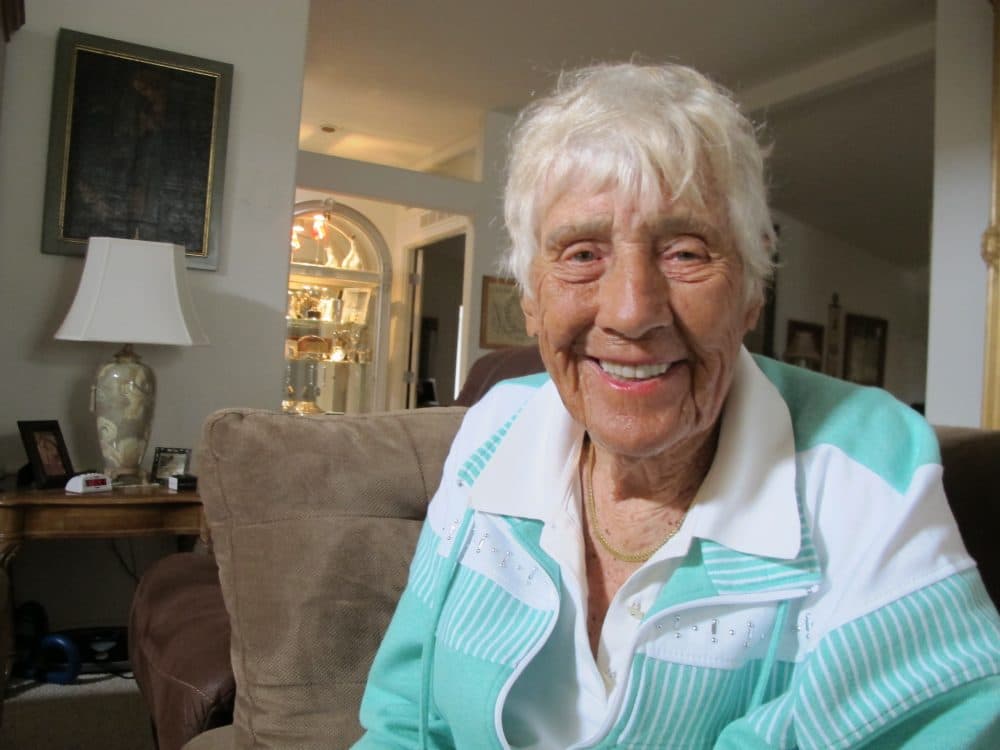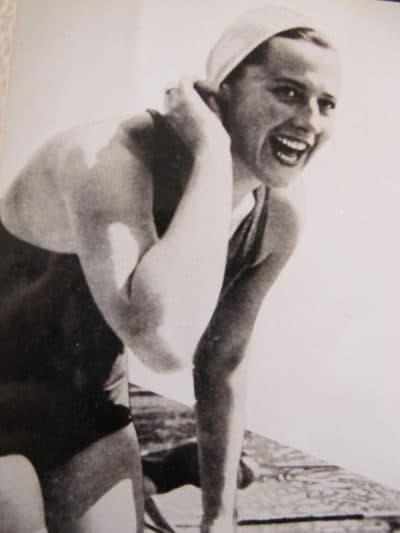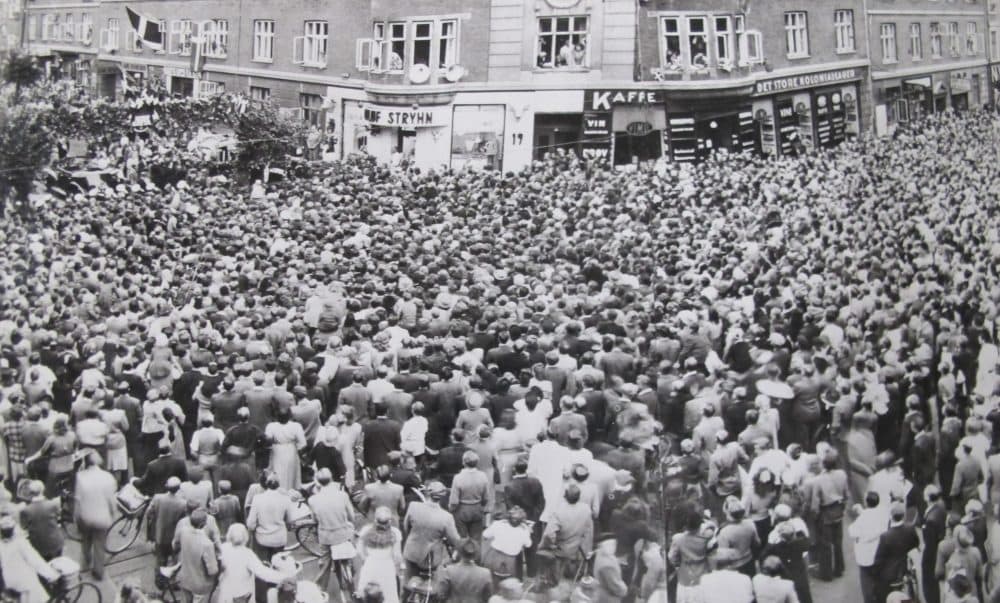Advertisement
After Nazi Occupation, Greta Andersen Won Gold For Denmark
Resume
Greta Andersen's home is dotted with mementos from her storied past. Framed ads featuring Greta for things like vitamins, motorboats and swimming pools hang on the wall. And tucked away in a corner of the living room, a glass case is filled with silver trophies, including a giant cup for winning a race across the English Channel. Next to that trophy sits a petite gold medal on a gold chain — a reminder of a life a long time ago.
"Sometimes, you have a talent and you don't know it before you start working on it," Greta says.
Growing Up In Wartime
Greta was 12 years old in the spring of 1940 when Nazis took over her native Denmark.
"I still remember the airplane coming over," she says. "They were dropping all kind of pamphlets, and they said, 'You are occupied by the Germans. You don't have a king anymore. We are in charge.' That was pretty horrible. They didn't like the Jews, and we had Jews living where I was living, and I can still hear them coming up the stairs and taking down the people and putting people up against the wall and just shooting people, just in front. I saw it. They just shoot people and they don't care. They were very nasty. At 12 years old, you just, you kind of don't really realize how bad it is. You just realize that, 'Oh, God, this is strange. They're shooting in the streets.'"
Greta's brother was a decade older than her and a freedom fighter, part of the Danish resistance movement. The fighters would get into battles with Nazis, shooting from windows on upper floors of buildings, including in Greta's hometown, outside of Copenhagen.
"I still remember the airplane coming over. They were dropping all kind of pamphlets, and they said, 'You are occupied by the Germans. You don't have a king anymore. We are in charge.' That was pretty horrible.”
"One time, my dad and I were right in the middle of a big gunfight and we stayed right in the middle of the road, and there was shooting from the windows," Greta recalls. "And my dad said, 'Stay in the middle! Stay in the middle! Don't go to the side.' We didn't get shot. We made it, obviously."
During the war, Greta's parents were worried that German soldiers would rape her, so they dressed her like a boy.
"I didn't like that I had to wear boys clothes. I remember that," she says. "And they got my hair cut. Now all of the sudden, you have to wear pants and boys' shoes and short hair. So I was dressed like a boy for five years, when they were occupying us."
German forces surrendered in May of 1945 and withdrew from Denmark.
"I can still see them walking out with all the belongings they stole," Greta says. "All the bags and all the clothes, and we were yelling at them when they walked out. The damn Germans."
A Talent Uncovered
After the occupation, Greta's life started to return to normal. Her dad decided that she should learn how to swim. After all, she lived in a country almost entirely surrounded by water.

"I was 16. I still couldn't swim," she says. "My dad tried to teach me, but I had a big inner tube on. And they were just making fun of me. I didn't want to get out of the inner tube."
Greta's dad eventually got her out of the inner tube at the local community pool, where she attracted a different sort of attention.
"There was a swim coach there," Greta says. "Her name was Else Jacobsen. She was one of the best swimmers Denmark ever had, and she happened to see me swim. And she made me swim 50 meters. I didn't know how to breathe, so I swam the 50 meter holding my breath. She said, 'Well, you've got good lungs. We have something to work with.'"
Jacobsen started coaching Greta in her own time, and Greta began to swim with the local club team. A month or so later, she placed third at the European Championship, her first swimming competition.
"In one year, I was among the best three in the world and then I became the best in the world," Greta says. "I guess I had the talent."
Vying For Olympic Gold
Soon, Greta was making plans to swim for Denmark at the 1948 Olympics in London. This was the first Olympics after the war, the first Olympics in 12 years.
"I got special privileges because I was the best one in Denmark at that time," Greta recalls. "I didn't go by boat because they didn't want me to get seasick. Oh, I remember. So the coach and me got to fly to London."
And when she got there, it was a celebration, with dorms and arenas filled with people from around the world...happy.
"It was fantastic," she says. "It was fantastic."
Denmark was expected to do well, with Greta leading the charge. She had the best time in the world in the 400-meter freestyle. But she was due to start her period, and team advisers were worried that would affect her performance. So they gave her a shot to try to hold it off. To this day, at nearly 90 years old, Greta still doesn’t know what it was. But it didn't hit her until she was in the pool, swimming her best event.
"I was in the lead, and then I just fainted," she remembers. "I know they put me in this room next to the pool, and I woke up and said, 'What happened? I don't remember what happened.' I fainted. But I would have won that 400-meter. And because of that, they didn't put me as an anchor of the relay. They were afraid that I would get sick again. So they put me second. We were gonna have the gold medal in the 4x100 relay, and of course we lost to America with one-tenth of a second."
Greta's mis-remembering. They actually lost by four-tenths of a second. But Greta did win gold in the individual 100-meter freestyle.
Denmark Celebrates
"When I won, they pulled me out of the water and made sure to help me put on the red pants and the white sweater, the Danish color of the flag," she says. "So, I probably still have my wet suit underneath. And my hair was still wet. They pulled me right up. I was standing on the podium, and it was a very wonderful feeling. The Danish flag go up and they were playing the national song. And behind me was the English king and queen. Oh, of course, it was wonderful.
"On the train home, it was all down with the windows and wave. And every train station had, I don't know, thousands and thousands of people. They were just, 'Hello! Welcome! Gold medal!' It was a big thing, you know. I really didn't expect it, but it didn't take long to get used to it. [Laughs] I got too tired to stand there and wave and wave and wave. I remember one of the swimmers said, 'Let me help you.' So she put on the uniform and waved because I couldn't lift my arms anymore."

An excited mob filled the streets outside of Greta's home — the same streets where a few short years before German soldiers had executed Jews. She got so many flowers that she ended up donating them to hospitals around Denmark because they wouldn't fit in her flat. That feeling of fear, hiding as a boy during the war? Gone.
Greta moved to the U.S. She got married and found even greater fame as a long distance swimmer. But nothing would compare to the 1948 Olympics.
"When I think back about it, it just seemed like another lifetime," she says. "It changed my life. It changed my life."
This segment aired on August 13, 2016.